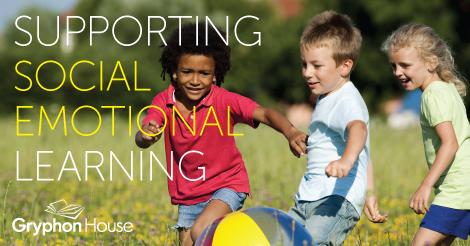
Anyone who works with young children—be they parents or educators—know that children’s emotions can be intense. A girl who is crying one moment may be happy the next, or a normally calm boy may resort to physical violence when his emotions get too strong. It is clear that young children feel emotions, but explaining or coping with those feelings can be difficult. In education, the ability of a child to understand and control their emotions is called emotional intelligence.
Between three and five years of age, children are primarily developing their social and emotional skills—they practice them in everything they do! Sharing toys during playtime or moving past an inconvenience (for example, picking another crayon if the one they want is gone) are examples of social emotional learning. However, these everyday victories don’t always help children understand why they feel a certain way or what they should do if they find themselves upset. That is where parents and educators come in! Adults can assist their children’s social emotional development by modeling proper conflict-resolution skills and having conversations about feelings.
Below is some information from Ellen Booth Church’s book Getting to the Heart of Learning. In it, she breaks down some of the social and emotional goals for certain ages, as well as what parents and educators can do to further social emotional intelligence.
3-Year-Olds
At three years old, children begin developing their sense of self and what that means in relation to other people. That’s why, at this stage, they begin to:
- Appear eager to please and be thought of as “good”, even if they don’t always understand the rules
- Become defensive and possessive of toys and personal space, sometimes resorting to hitting or shoving
- Begin to join other children in parallel play
Parents and educators support their three-year-old’s development by:
- Repeatedly verbalizing and modeling the rules so they are easier for children to follow
- Praising sharing, but understanding that not all children will be good at this skill at this point
- Playing simple turn-taking games that allow children to perform tasks both in a group and individually
- Allowing children to find their own play styles while still encouraging them to play with others
4-Year-Olds
Four-year-olds tend to be more systematic and outgoing than three year olds. They focus more on rules and doing things properly, and are more willing to participate in group activities. At this age they:
- Look for approval and support from adults
- Develop pride in themselves for following the rules, and may tattle on those who break them
- Begin using words to express their emotions, but still may resort to aggression if frustrated
- Will participate in group activities and cooperate with others during play most of the time
Parents and Educators can support their four-year-olds by:
- Providing praise and support for specific behaviors you want to encourage (i.e. sharing a toy, putting things away in their proper place)
- Encouraging and modeling cooperation by letting the children help create the class rules, yet understanding children may take rules very literally and tattle on seemingly irrelevant things
- Model conflict resolution skills and help build the children’s vocabulary of phrases to use in a conflict
- Extending group time since four-year-olds’ attention spans are longer, but move on when the children grow restless
5-Year-Olds
Once children are five, they develop more autonomy and do not need to be under constant attention. They also are in better control of their emotions and social skills. Some of the most significant milestones are:
- Being able to cooperate in groups without constant instruction
- Following the rules, but testing their limits
- Focusing more on making friends, having a best friend, or using humor to attract new friends
- Having a fair amount of emotional self-control, but potentially growing agitated in stressful situations
- Recognizing others’ emotions and needs
Parents and Educators can support their five-year-olds by:
- Being flexible with the rules and allowing the children more freedom to govern themselves
- Watching for peer exclusion or growing cliques
- Understanding that rules and limits will be tested, but choosing your battles over them
- Continuing to teach emotional intelligence by increasing emotional vocabulary, reading and telling stories in which emotions are experienced and handled, and being supportive and calming when children are overwhelmed
Author(s)Ellen Booth Church
Anna Wilmoth has extensive professional experience as a marketer, publisher, and reporter. She served as director of marketing at Gryphon House from Oct. 2014 - May 2017.
Topics: